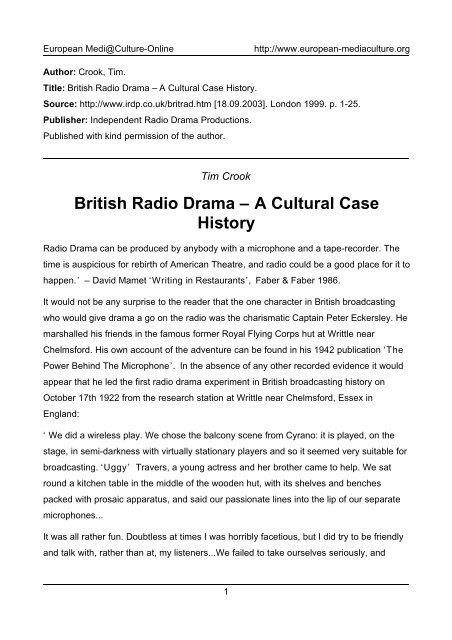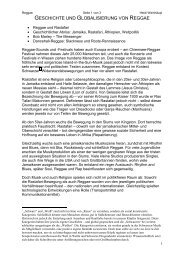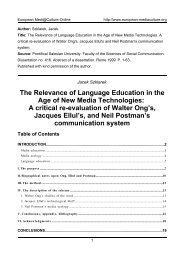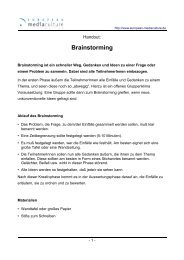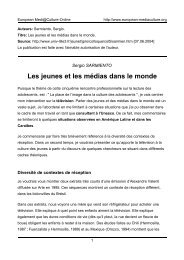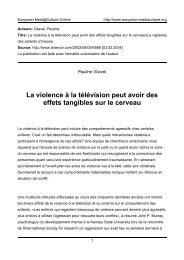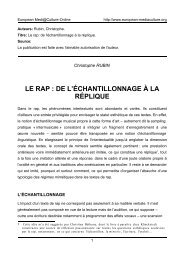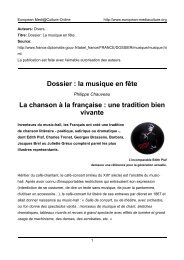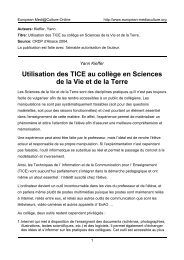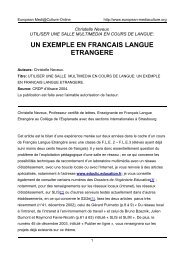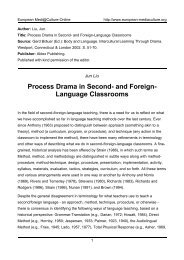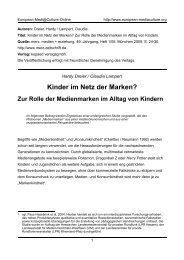British Radio Drama - European MediaCulture
British Radio Drama - European MediaCulture
British Radio Drama - European MediaCulture
Create successful ePaper yourself
Turn your PDF publications into a flip-book with our unique Google optimized e-Paper software.
<strong>European</strong> Medi@Culture-Online<br />
http://www.european-mediaculture.org<br />
Author: Crook, Tim.<br />
Title: <strong>British</strong> <strong>Radio</strong> <strong>Drama</strong> – A Cultural Case History.<br />
Source: http://www.irdp.co.uk/britrad.htm [18.09.2003]. London 1999. p. 1-25.<br />
Publisher: Independent <strong>Radio</strong> <strong>Drama</strong> Productions.<br />
Published with kind permission of the author.<br />
Tim Crook<br />
<strong>British</strong> <strong>Radio</strong> <strong>Drama</strong> – A Cultural Case<br />
History<br />
<strong>Radio</strong> <strong>Drama</strong> can be produced by anybody with a microphone and a tape-recorder. The<br />
time is auspicious for rebirth of American Theatre, and radio could be a good place for it to<br />
happen.’ – David Mamet ‘Writing in Restaurants’, Faber & Faber 1986.<br />
It would not be any surprise to the reader that the one character in <strong>British</strong> broadcasting<br />
who would give drama a go on the radio was the charismatic Captain Peter Eckersley. He<br />
marshalled his friends in the famous former Royal Flying Corps hut at Writtle near<br />
Chelmsford. His own account of the adventure can be found in his 1942 publication ‘The<br />
Power Behind The Microphone’. In the absence of any other recorded evidence it would<br />
appear that he led the first radio drama experiment in <strong>British</strong> broadcasting history on<br />
October 17th 1922 from the research station at Writtle near Chelmsford, Essex in<br />
England:<br />
‘ We did a wireless play. We chose the balcony scene from Cyrano: it is played, on the<br />
stage, in semi-darkness with virtually stationary players and so it seemed very suitable for<br />
broadcasting. ‘Uggy’ Travers, a young actress and her brother came to help. We sat<br />
round a kitchen table in the middle of the wooden hut, with its shelves and benches<br />
packed with prosaic apparatus, and said our passionate lines into the lip of our separate<br />
microphones...<br />
It was all rather fun. Doubtless at times I was horribly facetious, but I did try to be friendly<br />
and talk with, rather than at, my listeners...We failed to take ourselves seriously, and<br />
1
<strong>European</strong> Medi@Culture-Online<br />
http://www.european-mediaculture.org<br />
broadcasting, as we saw it, was nothing more nor less than an entertainment, for us as<br />
much as the listeners.’<br />
Two years later the BBC broadcast the first <strong>British</strong> play written for the radio medium. It<br />
was later translated into several different languages and in some countries it became their<br />
first radio drama production. Research by Kent University <strong>Drama</strong> lecturer Alan Beck has<br />
revealed important information and background on the cultural and artistic imperatives of<br />
story telling in a new medium. It is rather prosaic that Richard Hughes revealed in a 1956<br />
talk that he wrote the play overnight at the request of BBC producer Nigel Playfair.<br />
Fortunately parts of the text of his speech were reproduced in the BBC’s weekly<br />
periodical for the intelligentsia – ‘The Listener’. It is now defunct:<br />
‘ Those were the days of the silent film’, he said, ‘and our “listening play” (as I dubbed<br />
it) would have to be the silent film’s missing half, so to speak, telling a complete story by<br />
sound alone. Yet even the silent film did not, strictly speaking, rely on pictures only. It<br />
used sub-titles. Usually there was a sad man thumping appropriate themes on a piano.<br />
Some of the grander cinema-houses even employed an “effects man”; he wound a windmachine<br />
and pattered peas on a drum for the storm scenes; he accompanied the<br />
galloping cowboy with clashing coconut shells. We thought of using a narrator but agreed<br />
it would be a confession of failure. No, we must rely on dramatic speech and sound<br />
entirely – and it had never been done before.<br />
Our audience were used to using their eyes; this was a blind man’s world we were<br />
introducing them to. In time they would accept its conventions but how would they react on<br />
this first occasion? Better make it easy for them, just this once. Something which happens<br />
in the dark, for instance, so the characters themselves keep complaining they can’t see.<br />
Perhaps we could get the listener to turn out his lights and listen in the dark.<br />
“ Here’s a first line for you”, said Playfair. “The Lights have gone out!” Back in my flat in<br />
New Oxford Street I turned over possible situations. “The lights have gone out!” Not a<br />
bedroom scene – There was Major Reith to consider; nor did I care much about<br />
bedrooms, to be candid. An accident in a coal mine? I knew nothing about coal mines<br />
either, but it offered what I wanted technically. Total darkness; explosions and rushing<br />
water; the picks of the rescue-team, and that stripping of the human soul dramatists<br />
2
<strong>European</strong> Medi@Culture-Online<br />
http://www.european-mediaculture.org<br />
delight in. But all miners’ voices would be too hard to tell apart. Better a party of visitors –<br />
an old man, a young one, a girl. So I wrote all night and Playfair got his play with his<br />
morning coffee: “Danger”.<br />
With rehearsals and production however, a cold awakening! I had spread myself on sound<br />
effects without considering how they were to be done. Someone ran round the corner and<br />
enlisted the effects man from a cinema in the Strand – wind machine and all. But still we<br />
could make nothing sound as it was meant to sound; even in the studio, and leaving out of<br />
account the primitive transmission of those days which reduced all sounds to a single<br />
indistinguishable “wump” which might be the buzzing of a gnat, the clash of swords, the<br />
roaring of Niagara or the shutting of a door. Moreover the studio was a vast padded cell<br />
designed to make voices sound as if they were floating in outer space.<br />
How were we to make our voices sound like an underground tunnel? Playfair solved that<br />
one by making his cast put their handsome heads in buckets. And the Welsh choir we had<br />
collected (in those days, Welsh miners were singing in the London streets for coppers) –<br />
the script called for “distant snatches of hymn-singing”, but once started nothing could<br />
stop these chaps: only one studio, one microphone – Playfair put them in the corridor<br />
outside, with a sound-proof door he could open and shut.<br />
But the climax came when we said we wanted an explosion. The engineers had helped all<br />
they could, but this was the last straw. Even popping a paper bag would blow every fuse<br />
in Savoy Hill. But Playfair was something of a genius, and utterly unscrupulous. Reporters<br />
and critics were going to listen in a room specially provided for them, with its own loudspeaker.<br />
It would never do for them to hear no more than the diminutive “phut” like the<br />
roaring of a sucking-dove, even if that was all the public would get. So Playfair staged a<br />
magnificent “explosion” in the room next door to the press-room. Our “explosion” got top<br />
marks with the press. They never discovered they had heard it through the wall.<br />
And so – presumably for the first time in history, anywhere in the world – some sort of<br />
“listening play” specially written for sound somehow went on the air, thanks to Playfair’s<br />
ingenuity and the helping hands of all Savoy Hill. <strong>Radio</strong> drama had emitted its first, faint,<br />
infant wail.’<br />
3
<strong>European</strong> Medi@Culture-Online<br />
http://www.european-mediaculture.org<br />
The broadcast of ‘Comedy of Danger’ generated coverage in at least one national<br />
newspaper. It certainly did not amount to the faint infant wail described by Richard<br />
Hughes. The headline in the Daily Mail on Wednesday 16th of January 1924 was ‘<strong>Drama</strong><br />
Thrills by Wireless.’<br />
The play was broadcast from the BBC’s London and Glasgow stations so it was not<br />
entirely nationwide. One newspaper writer acknowledged that Richard Hughes had to<br />
bear in mind that as his audience could not see the play the action had to be represented<br />
by sound to represent rushing water, explosions, and pick-axe tappings. Listeners-in were<br />
advised that as the action of the play took place in the dark, they should hear it in the<br />
dark, and many adopted the advice and lowered the lights. The Daily Mail reporter<br />
described the production of the play at Savoy House:<br />
‘ In a brightly lit room a young woman in evening dress and two men holding sheets of paper in<br />
their hands declaimed to a microphone their horror at being imprisoned in the mine. Outside the<br />
room a young man sat cross-legged on the floor, with telephone receivers on his ears, and as<br />
he heard through the receivers the progress of the piece he signalled to two assistants on a<br />
lower landing to make noises to represent the action of the play. In a passage stood five men<br />
singing through a partly opened door leading to the broadcasting room. They were a group of<br />
“miners” singing in another passage of the mine.’<br />
At the end of the report the journalist observed that ‘Miss Joyce Kennedy, Mr. Kenneth<br />
Kent, and Mr H. R. Hignett acted very well.’<br />
<strong>Radio</strong> <strong>Drama</strong> throughout the 1920s and 30s was heavily influenced by theatre. It is<br />
interesting that the story of the production of ‘the Comedy of Danger’ demonstrates that<br />
live sound design for silent cinema brought an acoustic inspiration into the radio studios at<br />
Savoy Hill and the BBC’s purpose built ‘broadcast liner’ in Portland Place. But the<br />
absence of talking cinema until the early 1930s meant that text and performance style<br />
tended to be declamatory and either suited to the projection of the voice in a large space<br />
to a live audience or highly literate and narrative voice based. Unlike the American and<br />
Australian radio stations the BBC had no direct competition for dramatic entertainment.<br />
There was no management pressure to compete for audience and ratings. When it came<br />
from the continental commercial stations, many of which transmitted American radio soap<br />
operas, the BBC doggedly pursued the established Reithian tradition of giving the<br />
audience what the BBC believes it needs rather than what it perceives to be its wants.<br />
This was always done with ‘Received Pronunciation’ – a Home Counties upper middle<br />
4
<strong>European</strong> Medi@Culture-Online<br />
http://www.european-mediaculture.org<br />
class, public school and Oxbridge educated accent. Regional accents in presentation<br />
were only permitted during the Second World War years. By the time Wilfred Pickles<br />
presented the news in a Yorkshire accent Sir John Reith had left the BBC and was making<br />
his contribution to public life as the Minister for Transport.<br />
In the inter-war years the distinction between radio drama and the dramatic feature was<br />
somewhat blurred. It is now very difficult to distinguish the fiction from the non-fiction since<br />
all documentary production and ‘talks’ were heavily censored and ad-libbed<br />
spontaneous radio communication was not permitted. It was a far cry from Peter<br />
Eckersley’s charismatic performances in the 2MT hut in Writtle in 1922, which infuriated<br />
the bureaucrats in Marconi, the BBC and Post Office, but captivated the imagination of<br />
listeners. Even when the BBC invited ‘real ’ people into the studio or sought to transmit<br />
the voices of the working classes, initial interviews had to be transcribed by secretaries,<br />
edited by producers and editorial managers and then given back to the original subjects to<br />
reproduce for live or pre-recorded broadcast usually with wooden and self-conscious<br />
presentation. Any departures from the agreed script would be faded out and the<br />
subversive miscreant discreetly shown the door of Broadcasting House.<br />
There was a substantial dishonesty in this infrastructure of communication. It could be<br />
argued that the audience was not being ‘educated’ and ‘enlightened’ but culturally<br />
brain-washed and socially propagandised. Communist or left wing producers such as<br />
Archie Harding who caused trouble were despatched to Manchester by Director General<br />
Sir John Reith where if they continued to cause any trouble they would not be heard by<br />
the establishment. An ironic result of this radio-phonic Gulag Archipelago was that BBC<br />
Manchester features became the centre for pioneering and innovative programmes which<br />
sought wider representation of the people of Britain.<br />
From the 1930s, the Features Department of the BBC existed alongside the <strong>Drama</strong><br />
Department before they were eventually merged in 1967. The credit for exploring the<br />
unique dramatic potential of radio during the 1930s, 1940s and early 1950s belongs to<br />
Features rather than to <strong>Drama</strong> under Lord John Gielgud’s brother Val which tended to<br />
concentrate on book dramatisations or adaptations of theatre productions.<br />
5
<strong>European</strong> Medi@Culture-Online<br />
http://www.european-mediaculture.org<br />
Early exponents of radio’s experimental sound potential were Lance Sieveking and<br />
Tyrone Guthrie. The radio feature sought to recreate real-life stories using radio drama<br />
techniques. The form attracted significant poets some of whom became staff writerproducers<br />
such as Louis MacNeice.<br />
Significant productions by Features which have been repeatedly cited by critics include D.<br />
G. Bridson’s The March of the ‘45 (1936) and MacNeice’s Christopher Columbus<br />
(1942). They resemble Elizabethan chronicle history plays in existing as both dramatised<br />
history and poetic drama, documentary and fiction. The Features Department also<br />
produced plays specifically written for radio which have become somewhat iconic. They<br />
include Louis MacNeice’s The Dark Tower (1946) and Dylan Thomas’s much revered<br />
Under Milk Wood (1954) that has become a standard text for English and <strong>Drama</strong><br />
curriculum. The narrative performance by Richard Burton contributed to its success. It won<br />
the prestigious Prix Italia prize for radio fiction, has been made into a film and had many<br />
theatre presentations – the more recent in 1995 being presented on the Olivier stage of<br />
the Royal National Theatre.<br />
It would be right to ask the question why such successful works emanated from Features<br />
rather than Val Gielgud’s <strong>Radio</strong> <strong>Drama</strong> Department. It has been argued somewhat<br />
convincingly that <strong>Radio</strong> <strong>Drama</strong> tended to be hidebound by the conventions and codes of<br />
conventional theatre and dramatic narrative. Since the term ‘feature’ was so nebulous,<br />
producers and writers in this area of the BBC were in a better position to subvert<br />
production orthodoxy and discover and experiment with the potential of radio’s<br />
imaginative spectacle. They reflected the literary experiments in form advanced by James<br />
Joyce and the exploration of psychology and neuroses inherent in Franz Kafka’s work.<br />
There were attempts to assert the radiogenic rather than cinegenic. MacNeice sculpted<br />
his writing so that it carried the charge of a poetic, saga-like quest. Dylan Thomas used a<br />
traditional narrative framework to exquisitely celebrate the onomatopoetic riches of<br />
characterisation through voice.<br />
But it would be wrong to condemn the work of <strong>Radio</strong> <strong>Drama</strong> as pedestrian and ineffective.<br />
The high brow objectives of the BBC embraced a production of T S Elliott’s verse play<br />
‘Murder in the Cathedral’ which like Harold Pinter’s work of the 1960s probably worked<br />
6
<strong>European</strong> Medi@Culture-Online<br />
http://www.european-mediaculture.org<br />
better with the aural flexibility of the radio medium than the physical spatiality of stage<br />
theatre.<br />
Val Gielgud worked hard to develop specific radio performance skills. He formed a <strong>Radio</strong><br />
<strong>Drama</strong> company of actors to be available to perform in BBC productions, but more<br />
importantly to specialise and develop in a new drama performance medium. He and his<br />
directors consolidated radio’s intrinsic techniques of texture and narrative. They found<br />
little difficulty expressing the equivalence of moving from long shot to close-up in sound by<br />
using the intimate space and closeness of microphone performance. <strong>Radio</strong> could enter<br />
the minds of characters much more readily than the visual media.<br />
The stage device of soliloquy and aside which sometimes appears clumsy and artificial in<br />
the modern proscenium-arch theatre found its natural environment in radio where the<br />
microphone can focus very naturally on the interior workings of consciousness. Intimate<br />
emotion and mental turmoil can communicate to the listener with ease. Gielgud realised<br />
that as the listener cannot see the actor speaking, the words seem to come straight from<br />
the mind, not the mouth.<br />
Tyrone Guthrie went on to establish his reputation in film and theatre. Indeed he founded<br />
the Stratford theatre festival in Canada. In the late 1920s and early 1930s he worked as a<br />
producer at the BBC. His career as a radio playwright was cut short by personality clashes<br />
with Gielgud which resulted in a form of ‘cultural black-listing’ which is not an uncommon<br />
factor in the under-representation of a considerable number of playwrights, authors and<br />
directors. His play ‘The Flowers Are Not for You to Pick’ (1930), demonstrated that<br />
cinematic methods of montage, cross-fading and representing past, present, future, inner<br />
and outer consciousness had a place in the sound medium. The play exploited radio’s<br />
novelistic ability to dramatise the inner lives of people. Guthrie’s play is all in the mind of<br />
its central character, who as a drowning man in the middle of an ocean is located<br />
realistically in a position unrealisable in the theatre, except in a highly stylised way.<br />
Guthrie conveyed the central character’s review of his entire life through a series of<br />
flashbacks and audio collage of memories flitting through rapid transitions of time and<br />
place. Lance Sieveking was busy pushing the radiophonic boundaries so that much of his<br />
work would never have worked on the stage. His ‘Kaleidoscope I’ broadcast in 1928<br />
7
<strong>European</strong> Medi@Culture-Online<br />
http://www.european-mediaculture.org<br />
represented a brave experiment in montaging speech and sound and its pace resembled<br />
the style of visual editing in cinema. Avant-garde auteurs such as Guthrie and Sieveking<br />
had to work with live performances and primitive monophonic technology. Scene changes<br />
and segueing could only be achieved by switching between studios. Magnetic tape,<br />
invented and developed by the Germans, was not available in radio production until the<br />
middle to late 1950s.<br />
The major cultural issue concerning radio drama in Britain in the 20th century is why it<br />
took so long for the BBC to introduce popular series and serials. The concept of the radio<br />
soap opera was invented by the Americans, developed by the Australians and Latin<br />
Americans with huge success. Britain’s earliest soap, ‘The Robinsons’ first appeared<br />
during the Second World War. It was an import and not a home grown and tried<br />
programming product. Canadian comedy writer Alan Melville was directed to devise a<br />
radio soap to be broadcast to the United States and Canada on the BBC’s North<br />
American Service with the political objective of demonstrating <strong>British</strong> pluck, courage and<br />
resistance to Hitler, the Luftwaffe and the Blitz. Its first title was ‘Front Line Family’ and it<br />
showed the Robinson family bravely coping with rationing, bombs, their RAF aircrew son<br />
going missing, their daughter Kay falling in and out of love. It was a hit in North America.<br />
Other overseas services started to broadcast it and servicemen on leave and dial<br />
twiddling Brits were finding it as a welcome alternative to Lord Law-Haw. Dulcie Gray who<br />
played the Robinsons’ daughter in law said everyone knew that the drama was politically<br />
motivated:<br />
‘ It was classed as propaganda and we knew the aim was to get the Americans into the war. I<br />
was very committed. My mother had been killed by the Japanese, my brother was a prisoner of<br />
war. My husband was serving in Northern Ireland. Practically everybody we knew was affected<br />
by the war in some way. Almost immediately, we got a tremendous number of letters from<br />
people in America and all over the Empire. They seemed really moved by the stories. I can’t<br />
claim we were solely responsible for bringing in the Americans and winning the war, but I feel<br />
our little soap opera helped.’<br />
Throughout the 1930s Val Gielgud had prevented the development of a BBC radio soap.<br />
He considered it vulgar and a bastard form of drama from the USA. While the Front Line<br />
Family was renamed ‘The Robinsons’ and became a huge success on the Home<br />
Service, Gielgud issued a directive to members of the BBC Repertory Company that<br />
working in a radio soap would be a breach of contract. The Robinsons ran for six years<br />
8
<strong>European</strong> Medi@Culture-Online<br />
http://www.european-mediaculture.org<br />
until 1948 and outlasted the war. It does seem extraordinary that the prejudice, pomposity<br />
and elitist discrimination of one man can be responsible for holding back the tide of one of<br />
the most significant radio programming forms this century. But Gielgud’s belief that soap<br />
opera was cheap and nasty was echoed by the BBC’s senior management.<br />
The BBC did not need soap operas to survive. There was no competition. The Robinsons<br />
mutated as a result of broadcasting becoming an informational propagandist weapon. The<br />
audience popularity for dramatic story telling in the soap opera form was a benign and<br />
accidental side effect. Gielgud’s vituperative and implacable opposition to soaps could be<br />
divided into the following arguments:<br />
F) If an actor became a household name in a soap opera he would end up demanding<br />
more money until he was being paid as much as the most distinguished repertory<br />
thespians.<br />
G) Serial actors were not in the classical thespian league.<br />
H) The soap opera was ‘deliberately constructed to hit the very centre of the domestic<br />
hearth by playing variations on the theme of all kinds of domestic trivia.<br />
I) The <strong>British</strong> public would not like it because they would realise that soaps are capable of<br />
achieving a quite unreasonable influence.<br />
But it would be wrong to condemn Gielgud’s contribution to broadcasting on the basis of<br />
his elitist attitude to popular drama. It can also be argued that his commitment to high<br />
cultural standards established a more qualitative tradition of writing, direction, production<br />
and performance in Britain. The Second World War accelerated changes and accentuated<br />
the need for thoughtful and moral enhancing drama. Production expanded. The number of<br />
plays and special series increased. There is also evidence that <strong>British</strong> radio drama sought<br />
to challenge the venom of anti-Semitism on at least one occasion.<br />
Gielgud commissioned and produced In The Shadow Of The Swastika which starred<br />
Marius Goring in the role of Adolf Hitler. The plot and production offered a humanist<br />
challenge to the prejudice engendered by Nazi ideology. The series’ strength lay in its<br />
use of irony and avoidance of didactic or propagandist explicitness. The drama explored<br />
the fate of a Hitler Youth girl whose life is saved by a Jewish surgeon in Berlin. As she<br />
drifts into semi-consciousness during anaesthesia she repeatedly mumbles ‘kill the<br />
Jews’ which is overheard by the Jewish doctor who is the only person capable of keeping<br />
her alive. He does not flinch from his Hippocratic oath.<br />
9
<strong>European</strong> Medi@Culture-Online<br />
http://www.european-mediaculture.org<br />
The BBC establishment, <strong>British</strong> Ministry of Information, were very uncomfortable<br />
confronting the vista of anti-Semitism and no further broadcasts of this serial were<br />
permitted and no more productions like it were ever commissioned during the course of<br />
the war. BBC <strong>Radio</strong> <strong>Drama</strong> challenged German dramatic propaganda by adopting an<br />
approach to classical stories and plays which allegorically and metaphorically symbolised<br />
Britain’s struggle to win the war and defeat ‘the dark forces of evil’. Dorothy L Sayer’s<br />
dramatisation of the life of Christ, The Man Born To Be King, is an example of this genre.<br />
The series, directed and produced by Val Gielgud, echoed the turbulent conflict in which<br />
the world was then embroiled.<br />
<strong>Radio</strong> drama expression has been very much a reflection of the politico-economic story of<br />
the twentieth century. Freedom of expression was fiercely controlled in the totalitarian<br />
regimes that sought to influence and control the thinking and beliefs of citizens. The<br />
broadcast environment here was state controlled. <strong>Radio</strong> drama was utilised for<br />
propaganda purposes. Intelligent and cunning dictators realised that propaganda worked<br />
if it was entertaining and floated within a well told story. Nazi Germany used skilful<br />
mixtures of popular music and drama to psychologically intimidate Allied troops and<br />
civilian populations. They were sometimes aided by American and <strong>British</strong> fascists who<br />
preferred to fight the war in Berlin, rather than London or New York. The American<br />
academic Frederick Wilhelm Kaltenbach used dramatic scripts in overseas English<br />
broadcasts to attack the <strong>British</strong> position in the war. He translated a radio play by Erwin<br />
Barth von Wehrenalp called ‘Lightning Action’ to celebrate the German victory in<br />
Norway. Twelve scenes were recorded on 5th April 1941 and the cast included the <strong>British</strong><br />
film actor Jack Trevor and other ex-patriots. He also satirised Roosevelt’s Lease-Lend Bill<br />
with a series of dramatic talks called ‘<strong>British</strong> Disregard for American Rights’.<br />
The German actress Gertrud Hahn presented a series ‘Hot Off The Wire’ where she<br />
played the role of a switchboard operator at the Pittsburgh Tribune reading letters from the<br />
paper’s Berlin correspondent ‘Joe ’. In his letters Joe eulogised Nazi achievements and<br />
condemned the newspaper’s editors who were given Jewish names: ‘Rosenbloom and<br />
Finelstein’. He said they ‘change his wires round and won’t tell the truth about<br />
Germany.’ Another very influential American-German academic Otto Koischwitz<br />
originated a series called ‘Dr Anders and Little Margaret’ where the character Little<br />
10
<strong>European</strong> Medi@Culture-Online<br />
http://www.european-mediaculture.org<br />
Margaret was an American girl who had come to Germany to see her grandmother and<br />
found a delightful daily routine of sumptuous meals, plays, songs and general happiness.<br />
In May 1944 Koischwitz wrote a doomsday radio play for the D-Day invasion forces and<br />
their families at home which was broadcast by short-wave to the United States. The<br />
actress Mildred Gillars played the part of a GI’s mother who in a tear-stained monologue<br />
predicted disaster and grief:<br />
‘ Everybody says the invasion is suicide. The simplest person knows that between seventy and<br />
ninety per cent of the boys will be killed, or crippled for the rest of their lives!’<br />
The influence of Gielgud and dictatorial Director-Generals such as John Reith and more<br />
recently John Birt raises the issue of ownership versus control and ‘professionalism’<br />
within a radio broadcasting culture. In a sense the shareholders of the BBC are the<br />
licence-payers but it is arguable whether they have any direct control or influence over day<br />
to day and yearly management of the corporation.<br />
Strategy is certainly not directed by licence-payers. The BBC is only obliged to produce a<br />
private company audit to Parliament rather than the more rigorous reporting demanded of<br />
local authorities by the Audit Commission. The BBC engages in ‘audience consultation’<br />
campaigns but these have often been criticised for being palliatives and gestural. In reality<br />
licence-payers are powerless in relation to BBC decision making. BBC managers and<br />
Director-Generals are unique in having allocative as well as operational control. The<br />
analysis of the history of Reith’s control over staffing culture and programming content<br />
suggests that there have been and continue to be powerful conflicts between the skills<br />
and expertise of professional values to which BBC radio programme making personnel<br />
aspire and the ideological intentions, political aspirations and cultural imperatives of senior<br />
management.<br />
In 1977 the academic writer Tom Burns conducted three hundred interviews with BBC<br />
staff and detected a cult of the professional where references on quality, motivation and<br />
objectives had more to do with peer approval and impression. He found that three<br />
imperatives were often in conflict with one another. They were:<br />
1. Reithian view of public service and responsibility to the licence-payer.<br />
2. Referring to fellow professional standards – the cult of the professional.<br />
11
<strong>European</strong> Medi@Culture-Online<br />
http://www.european-mediaculture.org<br />
3. Audience ratings as a measurement of judging the success or failure of the<br />
programme.<br />
During Reith’s period of stewardship the first imperative was predominant. Under Sir John<br />
Birt, the third and then second imperatives would appear to be the priorities on the basis<br />
of interviews with BBC radio drama directors past and present.<br />
The post Second World War period has been a particularly rich one for <strong>British</strong> radio<br />
drama, although in recent years the insecurity engendered by the digitised and multimedia<br />
age has meant that it has become a casualty of fashion and the BBC’s ventures into<br />
digital and Internet communications.<br />
The soap opera not only survived but expanded. <strong>Drama</strong> director Val Gielgud allowed Mrs<br />
Dale’s Diary to fill the vacuum left by the Robinsons. Hilary Kingsley speculated that<br />
Gielgud was probably persuaded that the nice middle-class doctor’s wife Mrs Dale was<br />
not really a soap person. A BBC document reveals that they thought Mrs Dale’s Diary<br />
was ‘not a soap opera of the kind which abounds in American radio.’ Mrs Dale outlasted<br />
Val Gielgud and had a twenty one year run between January 1948 and April 1969 where<br />
its popularity after 5,531 episodes was such that Liberal MP Peter Bessell tried to<br />
introduce a parliamentary reprieve.<br />
Dick Barton – Special Agent captivated the imagination and spirit of adventure during the<br />
post war rationing period. The Department of Agriculture’s desire to improve farming<br />
efficiency and the demand by listeners at a public meeting in Birmingham for a rural Dick<br />
Barton led to the creation of ‘The Archers’ which has become the world’s longest and<br />
most successful soap. It still commands the highest audiences on the BBC <strong>Radio</strong> flagship,<br />
<strong>Radio</strong> Four. It had a slow and somewhat conservative approach to responding to<br />
changing social mores and the changing nature of <strong>British</strong> society. It was about twenty<br />
years before it recognised the presence of a substantial Asian community in the Midlands.<br />
The ‘Usher’ character then became something of a cliché for presenting every kind of<br />
racial issue that had been neglected up until her introduction in the story.<br />
‘ Waggoners Walk’ which started on BBC <strong>Radio</strong> 2 in April 1969 sought to capture the<br />
tensions of student protest, sexual equality, contraception and a more socially mobile<br />
society. It was a product of the ‘swinging sixties’ ‘rebellious youth culture’, ‘the<br />
12
<strong>European</strong> Medi@Culture-Online<br />
http://www.european-mediaculture.org<br />
Beatles’ and fall out from student protests against Britain’s support for America in<br />
Vietnam. It featured three young women, Tracey, Lynn and Barbara sharing a flat in<br />
Hampstead. One had an illegitimate child and married a homosexual (who later<br />
‘reformed’), another’s marriage broke up and the third lived in sin. Waggoner’s Walk<br />
threw itself into social problems such as abortion, child custody, hypothermia, murder, and<br />
confrontations of every kind. By 1974 it had an audience of four million listeners which<br />
was much higher than the Archers. There was even a competition so that listeners could<br />
write their own plots. The suggestion that the whole cast board a bus which was then<br />
driven over the edge of a cliff was somewhat portentous because the series was axed in<br />
June 1980 as part of a money-saving plan.<br />
At a time when television now commanded the centre of attention in terms of domestic<br />
entertainment, it could be argued that liquidating such a popular story telling form in radio<br />
was another example of the BBC cutting off its nose to spite its face. New attempts to<br />
launch soap operas on the radio by the BBC have been heroic failures. They include<br />
‘Citizens’ which tried hard to be a radio ‘Eastenders’ but failed to be eclectic in its<br />
audience objectives, lacked a community cohesion in plot and tried to be too worthy with<br />
contemporary issues at the expense of basic dramatic values. The origination of new BBC<br />
soaps has been the preserve of the BBC World Service where the objective has been to<br />
promote an image of a new multi-cultural Britain. Other motives have been to ‘help third<br />
world countries’ devise popular soaps that promulgate social action and education.<br />
Exports of the <strong>British</strong> radio soap opera tradition have taken root in Moscow where Prime<br />
Minister Tony Blair was persuaded to play a cameo role on a visit to Russia, Afghanistan,<br />
and parts of Africa.<br />
The post war establishment of the Third Programme, later becoming <strong>Radio</strong> Three<br />
provided a platform for more abstract and experimental explorations of the audio drama<br />
story telling form. Combined with the scope and soundscape for popular and challenging<br />
writing on the Home Service, later to become <strong>Radio</strong> Four, BBC <strong>Radio</strong> <strong>Drama</strong> enjoyed<br />
something of a golden age during the 50s 60s and 70s. Indeed the inauguration of<br />
Independent television in 1955 was upstaged and overshadowed by the death of Grace<br />
Archer in a dramatic episode of the Archers on the Home Service.<br />
13
<strong>European</strong> Medi@Culture-Online<br />
http://www.european-mediaculture.org<br />
In this period <strong>British</strong> radio drama developed confidence in its exceptional and intrinsic<br />
characteristics:<br />
A) Narration was employed more fully in radio communication. It has not been a popular<br />
story telling device in cinema and was rather rare in Western theatre. It borrowed from<br />
the tradition of the Chorus in Greek tragedy and Brecht’s pioneering work with Berliner<br />
Ensemble who was introduced to Britain along with Samuel Beckett through theatre<br />
clubs and the enthusiastic critical evangelism of Martin Esslin and Kenneth Tynan.<br />
B) Narration marked the natural and elegant symbiosis between radio playwriting and<br />
literary prose. Its power is directly linked to the ability of radio to render the speaker<br />
invisible.<br />
C) The logic of narrative voice in radio drama stimulated a diametric rebellion by avantgarde<br />
and experimental writers who derived their inspiration from the absurdists.<br />
Samuel Beckett’s ‘All That Fall’ directed by Donald McWinnie in 1957 is an example<br />
of this. The need to establish notions of realistic sound as symbols gave birth to the<br />
BBC radiophonic workshop.<br />
D) Narration as a story telling concept was explored in unique ways such as ‘Under Milk<br />
Wood’ where it functioned as a verbal camera. The Greek choral narrative structure in<br />
independent radio’s dramatisation of Joseph Conrad’s ‘Heart of Darkness’ in 1990<br />
was another example of radio narration serving the purpose of verbal camera.<br />
E) The narrative long shot in radio could establish with a few words and within a few<br />
seconds a fictional reality that would be financially prohibitive in any other medium.<br />
F) The Hitch-Hiker’s Guide to the Galaxy in 1978 which was produced by the Light<br />
Entertainment department acquired cult status and had been substantially constructed<br />
by the writer Douglas Adams through narrative framework and imagery which was as<br />
rich and imaginative as any cinematic science fiction blockbuster such as 2001 or the<br />
Star Wars Trilogy.<br />
G)The production challenge of establishing the world of self-parodying cosmic fantasy,<br />
weird life forms, time warps, a major character with two heads, visits to bizarre planets,<br />
interactive and loquacious computers became an opportunity in the radio medium. The<br />
transfer to television was a failure. Imaginative stimulation on the radio turned out to be<br />
tacky and unrewarding in a modestly budgeted studio based drama shot on video.<br />
F) In radio drama fantastic and symbolic worlds with characters and creatures never<br />
visually realised found their home. Mervyn Peake’s Gormenghast novels transferred<br />
into audio dramatisation with energy and verve during the 1980s. It can be argued that<br />
Henry Reed’s 1947 radio adaptation of Herman Melville’s Moby Dick was more<br />
effective than the John Huston film that struggled to transform the novel’s allegorical<br />
texture into special effects and superficial representations of reality.<br />
G) <strong>Radio</strong> drama could give life to inanimate objects and it could be argued that a<br />
postmodernist tradition took root in the work of Don Haworth whose 1975 play ‘On a<br />
Day in a Garden in Summer’ was populated with vocalised ‘characters’ who were in<br />
14
<strong>European</strong> Medi@Culture-Online<br />
http://www.european-mediaculture.org<br />
fact plants. A 1998 BBC radio drama production anthropomorphised two goldfish with<br />
cognition and imagination. (The Goldfish Bowl by Shaun Prendergast).<br />
H) <strong>Radio</strong> <strong>Drama</strong> was a natural home for Elizabethan and Jacobean tragedy, where<br />
ghostly apparitions resonate fully with the listener’s imagination so that Hamlet’s<br />
father and Banquo are I: The century’s progress in psychiatry, psycho-analysis,<br />
psychology and psycho-pathology find in radio drama the most flexible medium of<br />
expression. What better space than the theatre of the mind? Louis MacNeice’s<br />
adaptation of Virginia Woolf’s ‘The Waves’ which requires the expression of six<br />
disembodied consciousnesses belonged in radio rather than film, television or theatre.<br />
The composer John Cage created ‘Roaratoria – An Irish Circus’ out of James<br />
Joyce’s ‘Finnegan’s Wake.’<br />
So the post war period fostered the recognition and development of leading playwrights in<br />
a modest and growingly self-confident milieu. Samuel Beckett produced a canon of radio<br />
plays for the BBC which are substantial contributions to his cultural value as a writer. His<br />
respect for the medium is such that he left a codicil in his will preventing the stage<br />
adaptation of his radio texts.<br />
Tom Stoppard’s successful and significant stage play, Indian Ink, was conceived and first<br />
produced as the radio play In the Native State. I am prepared to argue that John<br />
Tydeman’s radio direction was better than any stage presentation of the text. Britain’s<br />
foremost living woman stage playwright is Caryl Churchill. But the majority of her first<br />
experiences with professional drama production were as a radio playwright. There were<br />
nine productions with BBC radio drama up until 1973 when her stage work began to be<br />
recognised at the Royal Court Theatre. Hanif Kureishi, regarded as one of Britain’s<br />
leading Asian writers, famous for his film My Beautiful Launderette and his novel The<br />
Buddha of Suburbia was first produced in radio. Tom Stoppard’s first professional<br />
production was in the fifteen minute Just Before Midnight slot on BBC <strong>Radio</strong> which<br />
showcased new dramatists. Joe Orton was discovered by radio drama and first produced<br />
in this slot.<br />
In 1963 BBC radio director, John Tydeman, advised rewrites and a change of title and The<br />
Ruffian On The Stair became Orton’s dramatic debut. John Tydeman also read one of his<br />
stage scripts, Entertaining Mr Sloane, and suggested he send it to the influential agent<br />
Peggy Ramsey who confirmed that he was a writer of outstanding promise, and married<br />
the script with theatre producer Michael Codron. The play rapidly snowballed into a West<br />
End success. Sue Townsend, Harold Pinter, Alan Ayckbourn, Alan Plater, Anthony<br />
15
<strong>European</strong> Medi@Culture-Online<br />
http://www.european-mediaculture.org<br />
Minghella, Angela Carter, Alan Bleasdale, Willy Russell and Louis MacNeice are a few<br />
other literary luminaries whose roots were planted in radio drama. Ayckbourn worked with<br />
the legendary radio drama director Alfred Bradley in Leeds. Giles Cooper, who is better<br />
known for his radio plays, started as a radio actor. Robert Bolt learned the craft of writing<br />
by producing scripts for Children’s Hour. The radio productions in 1960 of Harold Pinter’s<br />
two short plays, A Slight Ache and A Night Out, are credited with creating the favourable<br />
critical climate for his first major stage success, The Caretaker.<br />
Several critics have argued that radio is the natural home for the theatre of the absurd,<br />
and there was something approaching a revolution in radio drama between the mid-1950s<br />
and the mid-1960s, with Giles Cooper, Samuel Beckett, Rhys Adrian, Frederick Bradnum,<br />
Harold Pinter, James Saunders, Barry Bermange, Joe Orton and Tom Stoppard.<br />
It is now clear that the early exponents of original writing for radio felt compelled to<br />
compensate for its blindness by celebrating rich verbal textures and colours for the ear.<br />
Dylan Thomas’s ‘Under Milk Wood’ is an obvious example of this achievement. The<br />
new generation of writers engaging the absurdist tradition employed minimalist styles of<br />
dialogue and the power of subtext in language to stimulate the imagination of the radio<br />
drama listener. Original radio plays of exceptional stature have bridged the ‘Look Back In<br />
Anger’ generation with the present day. They include David Rudkin’s Cries from<br />
Casement As His Bones Are Brought to Dublin (1973) and John Arden’s Pearl (1978),<br />
Robert Ferguson’s Transfigured Night (1984) and Howard Barker’s Scenes from an<br />
Execution (1984) and Anthony Minghella’s Cigarettes and Chocolate. (1988).<br />
One of the paradoxes of radio drama is that highly accomplished and revered writers who<br />
have chosen to specialise in this field remain locked in a cabinet of obscurity. Rhys Adrian<br />
died in 1990 having written 32 plays for radio, all of which had been broadcast. Their<br />
literary quality is marked by the fact that most were broadcast on the Third Programme<br />
and then <strong>Radio</strong> Three. This is the BBC’s cultural channel which is stamped with the<br />
kudos of intelligentsia approval. John Tydeman directed 27 of them. Adrian received<br />
several awards, yet a writer whose drama ‘reflected a questioning mind and a sensitive<br />
ear for the agony and laughter of ordinary lives’ has no mainstream cultural resonance.<br />
The same can be said of Giles Cooper who in the late 1950s and early 60s had a didactic<br />
force which paralleled the desire to recognise new voices and directions in <strong>British</strong> theatre.<br />
16
<strong>European</strong> Medi@Culture-Online<br />
http://www.european-mediaculture.org<br />
He cultivated the art of dramatically counterpointing the exterior and the interior of<br />
characters who felt themselves ‘trapped in the contemporary machinery of modern life<br />
and who were unable to escape’.<br />
Cooper wrote over sixty scripts for BBC <strong>Radio</strong>. His 1957 play The Disagreeable Oyster,<br />
along with the production of Samuel Beckett’s All That Fall were fundamental in creating<br />
the need for a permanent sound workshop to create aural images based on effects and<br />
abstract musical rhythms. The BBC’s annual radio drama writing awards were named<br />
after him and his radio script Unman, Wittering and Zigo was made into a film starring<br />
David Hemmings. Yet he could never be said to be a household name. If you cared to<br />
mention his name within earshot of a contemporary cultural crowd, you might be greeted<br />
with the withering question “Who?”<br />
John Mortimer in his autobiography Clinging To The Wreckage describes how the BBC<br />
radio drama director Nesta Pain repeatedly badgered him into writing his first radio play,<br />
Dock Brief. He says the experience was ‘to his lasting benefit’. She elicited a rewrite of<br />
the language for one of the central characters, and Mortimer realised he ‘was able to<br />
learn something of lasting value from a director’. Dock Brief became the catalyst for a<br />
meeting with theatre producer Michael Codron and launched his career as a playwright.<br />
John Mortimer’s son Jeremy has been at the heart of the BBC <strong>Radio</strong> <strong>Drama</strong> Department<br />
over the last two decades and has developed an international reputation as a dramaturge<br />
and director. He originated the national young writers’ festivals which have ushered in a<br />
new generation of writers and opportunities for multi-cultural expression and<br />
representation.<br />
Economic instability and the political pressure to reduce public expenditure presents<br />
hazards of boom and bust fluctuations in investment and production. The radio drama<br />
production environment becomes insecure and inconsistent. The pre-requisite for public<br />
funding is sometimes predicated on how well state funded radio drama performs in<br />
comparison with the audience surveys of its commercial counterparts. BBC <strong>Radio</strong> <strong>Drama</strong><br />
has been a casualty of these socio-economic dynamics. The play form for <strong>Radio</strong> Four has<br />
now been limited to one hour. The Script Unit has been abolished, the status of new<br />
writing downgraded, and bold and ‘dangerous’ plays have been ghettoised onto <strong>Radio</strong><br />
Three which caters for the minority intelligentsia. John Tydeman’s outstanding direction<br />
17
<strong>European</strong> Medi@Culture-Online<br />
http://www.european-mediaculture.org<br />
and production of Arthur Miller’s Death of a Salesman in 1993 was placed on <strong>Radio</strong><br />
Three. Its two and a half hour length would not have been a discredit to <strong>Radio</strong> Four, which<br />
in 1995 studded its Sunday schedule with eight half hour sequences of a surround sound<br />
dramatisation of Len Deighton’s novel Bomber. Impressive productions of<br />
Shakespeare’s plays are rarely scheduled on <strong>Radio</strong> Four and now seem condemned to a<br />
form of elitist cloistering on the successor to the Third Programme.<br />
The pressures which liquidated the new dramatist’s television studio play in favour of<br />
filmed series and serials have been visited on <strong>Radio</strong> <strong>Drama</strong>. Economic ideology imported<br />
by the Director-General, John Birt, and multi-million pound surveys produced by outside<br />
management consultants, with audience focus groups have marginalised talented and<br />
experienced editors and producers such as John Tydeman, Martin Jenkins, Sean<br />
McLaughlin, Jane Morgan and Nigel Bryant. Children’s drama, or young story telling<br />
sequences have been liquidated. The first <strong>Radio</strong> Five Network between 1989 and 1994<br />
pioneered a ‘young in mind and young at heart’ approach to radio drama production.<br />
Editor Caroline Raphael introduced new writing and performing voices. The network<br />
became an alternative production base for writers and actors, but was then sacrificed on<br />
the altar of BBC programming politics. The network made way for a more successful<br />
twenty four hour news and sport channel.<br />
Caroline Raphael became the <strong>Radio</strong> <strong>Drama</strong> Department’s first woman editor and she has<br />
been followed by the award-winning and innovative Manchester director Kate Rowland.<br />
However, children’s drama has not survived as a regularly scheduled mainstay of BBC<br />
radio drama production and broadcast. A minority half hour <strong>Radio</strong> Four slot on Sunday<br />
evenings has not been preserved in the new controller’s scheduling changes which took<br />
effect in April 1998. It could be argued that the death of children’s drama on BBC radio is<br />
an astonishing failure of public broadcasting philosophy and is in marked contrast to the<br />
experience in the USA where independent production companies maintain successful<br />
series and broadcast projects on a wide range of station formats.<br />
Eva Stenman-Rotstein at the publicly funded Swedish <strong>Radio</strong> Broadcasting Corporation<br />
has steered a series of evolutionary changes to young people’s radio drama that has<br />
captured a new generation of listeners. Story-telling for children and young people has<br />
reinvented itself and ‘delivered’ audiences.<br />
18
<strong>European</strong> Medi@Culture-Online<br />
http://www.european-mediaculture.org<br />
A further development at the BBC in 1997 saw the <strong>Radio</strong> <strong>Drama</strong> Department losing its<br />
editorial independence and become a production server to network controllers and<br />
commissioning editors whose decisions depend on the expectation of audience building<br />
and satisfaction. BBC World Service radio drama has lost its brilliant autonomous<br />
production culture. The devaluing of the licence fee has reduced the budgets and<br />
consequently the scope for diversity and scale of production. The suffocating market<br />
bureaucracy of ‘Producer Choice’ has meant that the BBC’s radio drama directors /<br />
producers have to show due consideration for paying for the cost of even one editing razor<br />
blade. The same amount of paper work is expended in the ordering of an item of<br />
equipment costing one pound as commissioning an established writer to produce a script<br />
for five thousand pounds. The <strong>Radio</strong> <strong>Drama</strong> repertory company of actors diminished from<br />
about 30 in the early 1980s to only 6 in 1999. When a pressure group and academics<br />
sought to celebrate the 75th anniversary of the broadcast of ‘The Comedy of Danger’<br />
actors and producers said they feared for the future of radio drama. The Giles Cooper<br />
Awards set up to recognise new writing in radio drama were deleted.<br />
It would appear that ‘professional autonomy’ in radio drama production at the BBC is<br />
facing its greatest intensity of constraints and pressures. Between 1995 and the year 2000<br />
BBC radio production and broadcast has undergone radical changes in ‘institutional<br />
organisation’. Any initial occupational socialisation by staff has been rapidly re-aligned.<br />
This has resulted in compulsory and voluntary redundancies. Unlike Reith and successive<br />
Director-Generals it would appear that Sir John Birt has rewritten the aims and objectives<br />
of the institutional organisation. On the inside market economic imperatives and<br />
catastrophic management and technology changes. On the outside the BBC’s public<br />
service remit remains, but Parliament is being asked to increase the BBC’s room for<br />
manoeuvre in commercial and global fields and to enjoy complete autonomy with regard<br />
to the changes to the institutional organisation.<br />
The only regulatory constraints have been to account for policy, actions and complaints<br />
before the House of Commons committee on Media, Culture and Sport. The Office of Fair<br />
Trading has sought to prevent a non-competitive cartel operating in television independent<br />
production where there has been a statutory threshold of 25% of output. The obligation in<br />
the context of national radio networks was 10% and only voluntary.<br />
19
<strong>European</strong> Medi@Culture-Online<br />
http://www.european-mediaculture.org<br />
The economic constraints have been increases in inflation and operating costs beyond the<br />
proportionate increase in licence fee income, the risk of licence fee non-payment, and the<br />
need to divert existing programming budgets for radio and television to support a 17<br />
million pound investment in Internet media and digital/satellite channel projects such as<br />
the twenty four hour news channel ‘News 24’.<br />
One strategy for maintaining professional autonomy in BBC radio drama production has<br />
been the move to ensure corroboration and confirmation of ‘cultural creativity’. This is<br />
the recognition of artistic merit through awards and independent critical coverage. It is<br />
postulated that the reputation generated by such accolades protect the artist/professionals<br />
from the oppressive constraints of institutional organisation. Unfortunately a new trend is<br />
emerging to disturb the certainty of the ‘cultural creativity’ factor. There is evidence that<br />
the BBC realises that public opinion and Parliamentary approval for the BBC’s licence fee<br />
depends on winning cultural celebration and approval, primarily within the UK. At what<br />
price and at what cost will the BBC ensure that it wins the major prizes? The advantage of<br />
this imperative is that the BBC is constrained to support professional infrastructures of<br />
production which can consistently achieve recognition for cultural creativity.<br />
It is problematic when the BBC controls the mechanism for cultural recognition and<br />
manipulates the parameters for selecting ‘cultural creative achievement’. For the edition<br />
of 11th to 17th July 1998 the <strong>Radio</strong> Times, the largest selling magazine in Britain and with<br />
the BBC as the major shareholder, decided to invite its readers to ‘vote for your all-time<br />
greats’. It explained that: ‘As there are so many memorable programmes and people to<br />
choose from, we asked a panel of experts to help you decide by nominating what they<br />
have enjoyed most’. The magazine explained that anyone was open to ‘disagree with<br />
their suggestions, just add your own’. People sending in their votes were automatically<br />
entered for a competition to win a widescreen television. Here was an example of the BBC<br />
through its powerful <strong>Radio</strong> Times gathering together the ‘great and good’ of<br />
broadcasting to identify the ‘best radio drama’ in Britain produced and broadcast over<br />
the previous 75 years. Not surprisingly all the nominated productions had been made by<br />
the BBC. One of the panel, Paul Donovan, was to later declare in his Sunday Times<br />
newspaper column that the BBC had had virtually no competition in radio drama. Eight of<br />
the nominated productions were titles in the BBC’s <strong>Radio</strong> Collection of audio cassettes<br />
20
<strong>European</strong> Medi@Culture-Online<br />
http://www.european-mediaculture.org<br />
which had a majority share of the spoken word market. The promotion therefore had a<br />
hidden commercial purpose and resonance masquerading as a cultural creative<br />
celebration and appreciation.<br />
The productions selected were:<br />
• The Adventures of Sherlock Holmes (1989 starring Clive Merrison and Michael<br />
Williams.)<br />
• The Archers (first national broadcast 1951)<br />
• Bomber (1995, starring Sam West)<br />
• Cigarettes and Chocolate (1988, starring Juliet Stevenson and Bill Nighy)<br />
• Jude the Obscure (1986, starring Michael Pennington)<br />
• Lord of the Rings (1986, starring Ian Holm and Michael Horden)<br />
• Spoonface Steinberg (1997, starring Becky Simpson)<br />
• A Tale of Two Cities (1989, starring Charles Dance)<br />
• Under Milk Wood (1954, starring Richard Burton and Rachel Roberts)’<br />
It is not clear that all members of the panel were involved in the selection of the radio<br />
drama nominees, but only 10 out of the 27 ‘experts’ had any professional or critical<br />
experience of radio. None were radio drama directors or producers. Only two had had any<br />
experience of writing radio drama and one of those specialised in comedy sketch writing.<br />
No one from independent radio, which by this time commanded the majority share of UK<br />
listening, was invited to join the panel. Despite the presence of the screenwriter and<br />
playwright Alan Plater as a member of the panel, the <strong>Radio</strong> Times feature on the<br />
competition omitted any mention of the authors or writers of the productions nominated.<br />
The artists associated with each production were the ‘stars’ in stage, screen or<br />
television. This assertion of the ‘star ’ or performer in the hierarchy of importance<br />
suggests a down-grading of the writer which had been a feature of the film world and<br />
television. As Hortense Powdermaker had stated in her anthropological investigation of<br />
‘Hollywood, The Dream Factory’:<br />
‘ From a business point of view, there are many advantages in the star system. The star has<br />
tangible features which can be advertised and marketed – a face, a body, a pair of legs, a voice,<br />
a certain kind of personality, real or synthetic – and can be typed as the wicked villain, the<br />
honest hero, the fatal siren, the sweet young girl, the neurotic woman...Here is a standardised<br />
21
<strong>European</strong> Medi@Culture-Online<br />
http://www.european-mediaculture.org<br />
product which they can understand, which can be advertised and sold, and which not only they,<br />
but also banks and exhibitors, regard as insurance for large profits.’<br />
The <strong>Radio</strong> Times had decided that Sir Arthur Conan Doyle, Len Deighton, Anthony<br />
Minghella, Thomas Hardy, Tolkien, Lee Hall, Charles Dickens and Dylan Thomas were not<br />
important enough to identify.<br />
It may well be premature to mark the recent changes at the BBC as the start of a<br />
snowballing decline of BBC radio drama and the potential extinction of a great tradition.<br />
On the 27th of January 1997, BBC <strong>Radio</strong> Four transmitted a rather simple monologue by<br />
Lee Hall performed by the young actress Becky Simpson. The single voiced narrative was<br />
interspersed with the simple adroitness of operatic extracts sung by Maria Callas.<br />
Spoonface Steinberg was part of a series called God’s Country, but the charming,<br />
moving and truthful expression of a 7 year old character who was affectionately known as<br />
‘Spoonface’ because of the shape of her face touched every adult’s protective parental<br />
instinct and resonated the cruelty of death through the injustice of the child’s agony.<br />
Spoonface is seven years old, Jewish, autistic, very bright – and terminally ill with cancer.<br />
The character presents a dimension of natural courage which we would all wish to find<br />
and the depiction of the heroic role in a character so young is in itself a brave step in the<br />
genre of dramatic writing. It is the doctor who introduces Spoonface to the passion of<br />
opera and she is able to apply her homespun philosophy to the divas who complete their<br />
performances with spectacular stage deaths.<br />
It was a rare event indeed for a BBC radio production to stimulate the receipt of hundreds<br />
of letters and phone-calls. The one hour production was immediately introduced in<br />
bookshops as part of the BBC’s <strong>Radio</strong> cassette Collection and has become a best-seller.<br />
The marketing of the anonymous quotation: ‘This was the most poignant piece of radio I<br />
have heard for years. I am a truck driver and was in tears’ may be apocryphal, but the<br />
response of Gillian Reynolds in the Daily Telegraph: ‘Hall ’s writing is funny, intense and<br />
poetic’, Paul Donovan in the Sunday Times ‘Inevitably harrowing but also blackly funny’<br />
and Sue Arnold in the Observer ‘Magnificently performed by 10 year old Becky Simpson’<br />
were real enough. It is most unusual for the commercial arm of the BBC, BBC Worldwide,<br />
to find a commercial benefit from marketing an original play by a relatively obscure new<br />
writer.<br />
22
<strong>European</strong> Medi@Culture-Online<br />
http://www.european-mediaculture.org<br />
A more challenging concept in the audio-drama genre is where improvised or scripted live<br />
performance interacts with contexts of reality. This type of storytelling has a satirical or<br />
entertainment purpose and often involves duping people with impersonations and<br />
delivering a hoax frame of narrative for the listener. Chris Morris whose series ‘Blue Jam’<br />
in the early hours of the morning on BBC <strong>Radio</strong> One has developed the role of a<br />
contemporary ‘dissident bard’. The humour and improvisation is socially and politically<br />
satirical as well as demonstrating postmodernist styles of ambient sound texture and<br />
dislocated and disrupted narrative direction.<br />
<strong>Radio</strong> as a source of communication has never lost its importance and value. <strong>Radio</strong><br />
storytelling is in a continual state of creative flux with the invention of new form and<br />
content. I think a common story in most cultures is that the development of television<br />
offered fame and financial reward for the creative intelligentsia. The stampede from radio<br />
to television was often driven by market forces, but television’s status as the pre-eminent<br />
media form is under threat from Multimedia. Audiences have now been empowered with<br />
visual, text and sound interactivity and radio drama sits much more comfortably than film<br />
or television in this environment. <strong>Radio</strong> is much more efficient as a medium of<br />
communication. Its audience can continue to physically move and perform transport,<br />
recreational and employment tasks. Unlike the visual media radio can laterally shift across<br />
the range of human activities as a direct source of media consumption. The mind’s eye is<br />
a continually playing movie for the imagination while text, video, film and still pictures are<br />
scanned stereoscopically in the physical dimension. Experimental one and two minute<br />
radio plays can now be accessed on an American web site. Britain’s Independent <strong>Radio</strong><br />
<strong>Drama</strong> Productions has introduced full length Internet Plays of the Month.<br />
Since 1987 radio drama has found a niche in UK independent radio which has secured<br />
state and private sponsorship, the support of audiences and the programme controllers of<br />
commercial talk and music formats. Two new writing schemes outside the BBC have been<br />
centred in the radio drama genre and provided professional writing opportunities for new<br />
writers over a ten year period. The distinguished writer and arts broadcaster Melvyn Bragg<br />
has gone so far as to say that the national young playwrights’ scheme for writers in<br />
commercial radio has become the most important new writing institution for young people<br />
in the country. The other scheme has persuaded the government arts funding body for<br />
23
<strong>European</strong> Medi@Culture-Online<br />
http://www.european-mediaculture.org<br />
London to recognise that radio drama has a legitimate place in the state subsidy of artistic<br />
and dramatic work. IRDP at LBC have pioneered the use of radio drama to stimulate and<br />
determine the content of live phone-in programming. The regular scheduling of five and<br />
ten minute drama series and the exploration of the symbiotic transfer of a script’s<br />
production between radio and theatre are further landmarks of development.<br />
The same period has also seen the maturing of an international spoken word market so<br />
that the ‘talking book’, ‘sound drama’ or ‘sound dramatisation’ is fighting for equal<br />
space on the shelves with traditional books. <strong>Radio</strong> drama’s ephemeral status as an art<br />
form is at an end. The performance of a dramatic script is now no longer existing in the<br />
fleeting moment of a live stage event. It is being captured on cassette, compact disc,<br />
computer file and other means of storage for replay. Some forms of sound story telling are<br />
equal to film videos in their availability and the permanence of access for future<br />
consumption. Multimedia and the Internet offer exciting dimensions to sound drama<br />
production and storytelling. The radio dramatist has been liberated from the dimension of<br />
short-lived terrestrial sound broadcasts.<br />
The Digital Audio medium is set to be the beginning of the first national broadcast<br />
competition for BBC radio in the field of radio plays, readings and comedy. The UK <strong>Radio</strong><br />
Authority awarded DigitalOne the licence for Britain’s first DAB multiplex. DigitalOne<br />
which is owned by the country’s largest radio group GWR was the only applicant. In<br />
January 1999 it advertised for interest in tendering for a mono channel to broadcast a<br />
predominantly speech based service of serialised plays, books and comedy programmes<br />
for 13 hours a day. It has emerged that the mono frequency had the capacity to be<br />
changed into stereo.<br />
Britain’s status as the world’s leading producer of radio drama can now be accounted for<br />
with the following conclusions:<br />
1. A monopoly, political stability, and sustained continuity of public funding through the<br />
licence fee. and openness; on the other, the BBC’s monopoly in nationwide<br />
broadcasting as a public-service institution.<br />
2. Independent commercial radio has never been given a level playing field of<br />
competition. Through the 70s and early 80s a considerable range of qualitative radio<br />
drama projects were initiated and broadcast, but they were restricted to local radio<br />
24
<strong>European</strong> Medi@Culture-Online<br />
http://www.european-mediaculture.org<br />
transmission and the inception of right wing Thatcherite Conservative governments<br />
meant that independent broadcasting was reformed along market economic lines.<br />
3. Public sector broadcasting principles enshrined in earlier Broadcasting Acts were<br />
liquidated. The concept of ‘secondary rental’ whereby a proportion of station profits<br />
were taxed to be invested in training, engineering, and cultural programming was ended<br />
in 1990. The considerable development of radio drama by the London station LBC from<br />
1987 was frustrated by poor management of the station, its withdrawal of licence,<br />
restriction to Greater London broadcasting, and greater fragmentation of the London<br />
radio market.<br />
4. Although the Reithian doctrine of disseminating high culture could be condemned as<br />
elitist and patronising, the concentration of public funding in radio drama at the BBC<br />
militated towards standards of excellence. The post war commitment to provide popular<br />
entertainment as well helped consolidate an international reputation for innovation and<br />
imaginative programming.<br />
5. BBC <strong>Radio</strong> drama was effectively the first national theatre of the air. National BBC<br />
radio drama broadcasts could bring the theatre into people’s homes. It was a cohesive<br />
and cost effective method of guaranteeing democratic access to classical authors such<br />
as Shakespeare and Dickens.<br />
6. BBC radio drama also served as a window on the world for international writers and<br />
classical authors from alternative cultures. Millions of listeners who had no inclination to<br />
visit live theatre had an opportunity of listening to the Greek classical dramatists such<br />
as Sophocles and Aeschylus. Nigerian author Chinua Achebe was introduced to Britain<br />
through BBC radio dramatisation of his books ‘Things Fall Apart’ and ‘Anthills of<br />
Savannah’.<br />
7. <strong>Radio</strong> drama production is much more cost effective than television, film and theatre<br />
and reaches a much higher audience in direct proportion to its costs.<br />
How does the production of <strong>Radio</strong> <strong>Drama</strong> in Britain fit into the frame of capitalist<br />
production? The guaranteed funding by licence fee at the BBC meant that selection of<br />
‘product’ was done for primarily aesthetic reasons. The demand of cultural activity is that<br />
its material is freely chosen and preferably new. <strong>Radio</strong> had the luxury of being able to deal<br />
with old favourites which had become classics and embedded in examination syllabuses.<br />
This means that as a product the BBC had never been compelled to select and discard its<br />
radiophonic cultural products when novelty passed and obsolescence intervened. It has<br />
the advantage that cultural consumption resists the drive to sell more, lower the price,<br />
increase the profit, and introduce efficiencies into the economies of scale. The dynamo of<br />
capitalism was adjusted because public service considerations, the broadcasting<br />
monopoly and guaranteed licence fee income interrupted the cycle of purchase,<br />
obsolescence and replacement.<br />
25
<strong>European</strong> Medi@Culture-Online<br />
http://www.european-mediaculture.org<br />
But since 1995, the formula has changed. The introduction of pseudo-internal markets<br />
through producer choice means that economies of scale and the notion of ‘marginal<br />
profit’ are now as important as aesthetic and cultural imperatives. From 1998, <strong>Radio</strong><br />
<strong>Drama</strong>’s main carrier <strong>Radio</strong> Four began to concentrate the process of commissioning on<br />
the basis of audience figures and research. The raison d’être was the same as in<br />
commercial radio. Programming selection depended on sustaining existing audience size,<br />
increasing ABC1 listeners, preventing loss of audience through ageing, and where<br />
possible achieving audience growth. BBC <strong>Radio</strong> was conscious of competition between its<br />
own networks. Editorial independence and commissioning power was taken away from<br />
the producers. All programming slots had to be ‘bid for’ by a selected panel of approved<br />
suppliers. Another important factor in any decision to commission has been the ability of a<br />
radio drama production to generate additional income through merchandising in the<br />
cassette, book, television, multimedia and video markets. Applying the capitalist dynamo<br />
has the effect of keeping innovative production as cheap as possible.<br />
The measured effects of this change in the economic equation of BBC radio drama<br />
production is that economies of scale have been reduced by trimediarisation – combining<br />
BBC drama production in radio, television and film into one unit. Innovation tends to be in<br />
the short form of programming content. Monologues and low cast productions have<br />
increased. The proportion of new writing and newly commissioned radio texts has<br />
declined vis-à-vis dramatised literature or adaptations of film and theatre scripts. This<br />
trend substantially reduces the costs of paying original writers and engaging producers<br />
with the dramaturgy of working with writers to develop an original script to completion and<br />
suitability for production.<br />
This work, and any part of it, is copyright. Putting any part of this work to any<br />
unauthorised use is a punishable offence and liable to prosecution. This applies in<br />
particular to reproduction, translation, copying, micro-filming, electronic storage or any<br />
other electronic re-working.<br />
26


